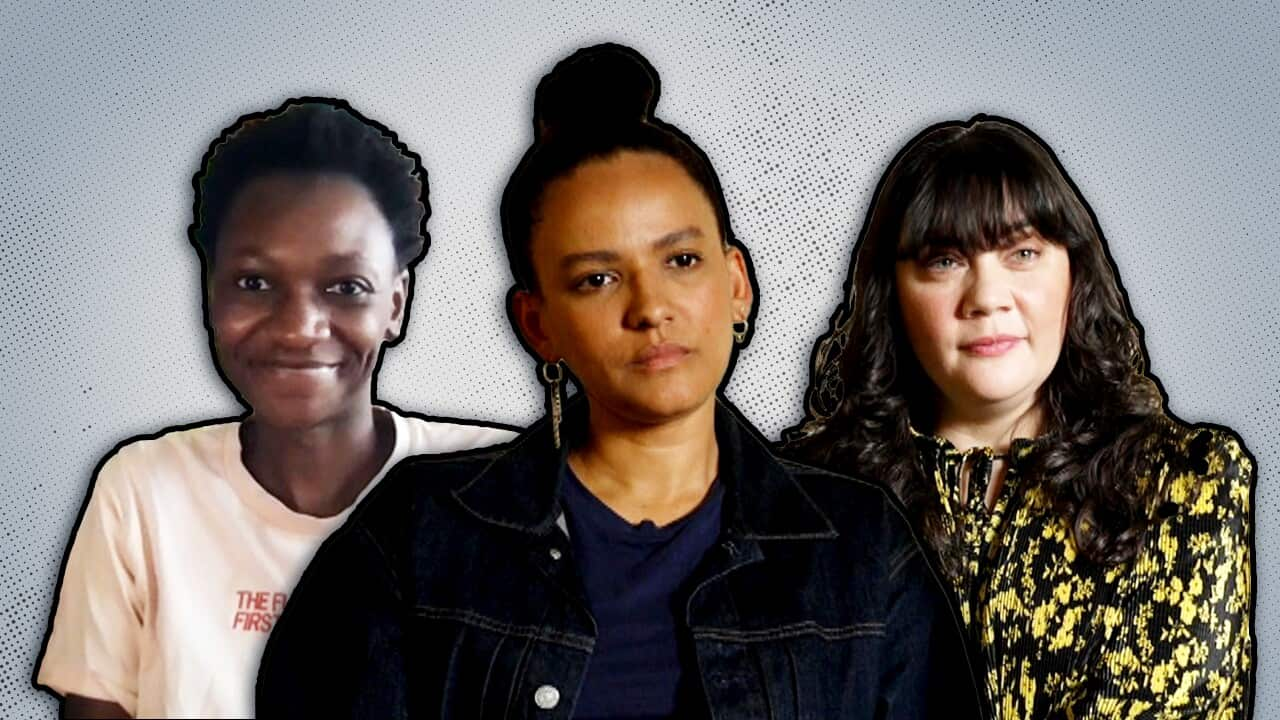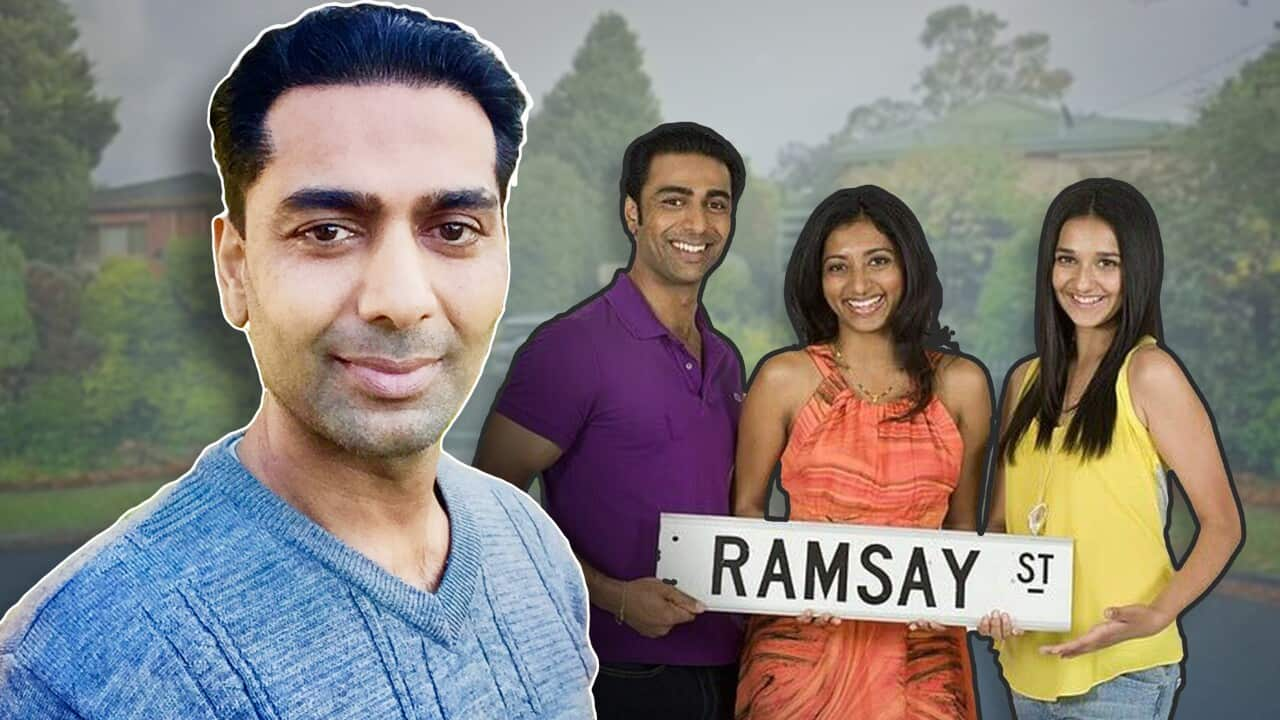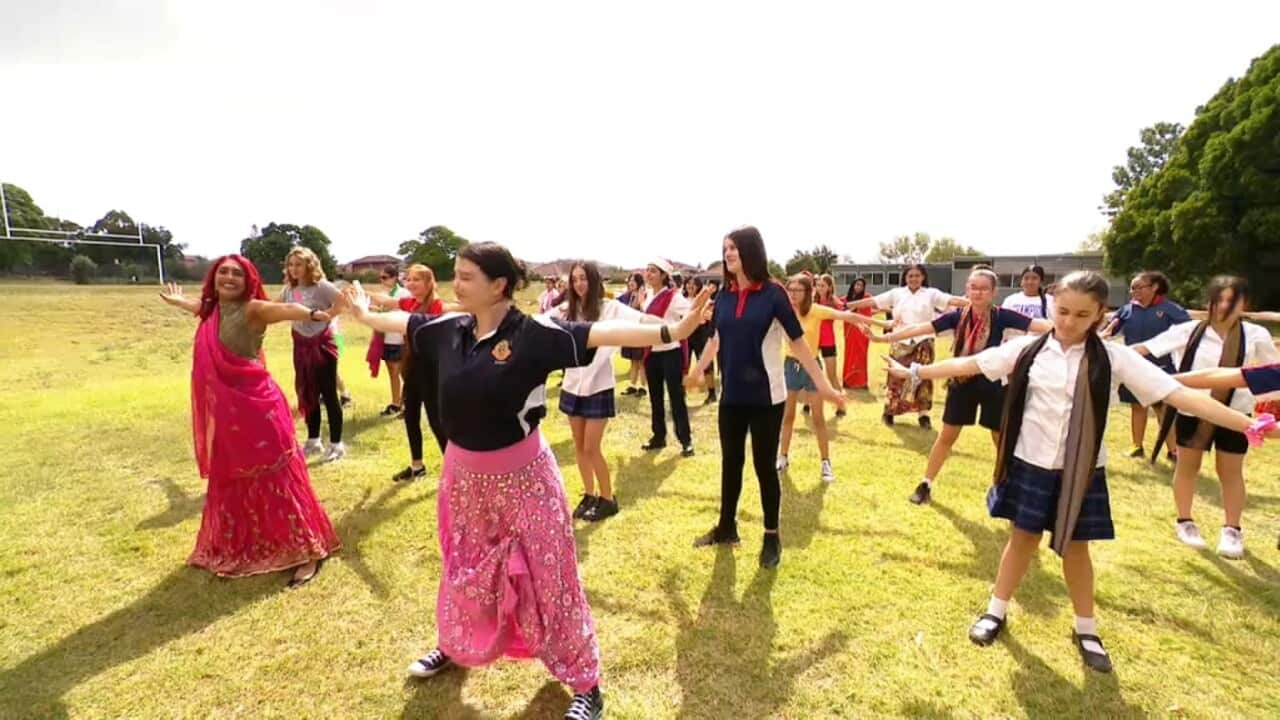As Moreblessing Maturure sat watching seven methods of killing kylie jenner on opening night, she held her hand up to her face, as if trying to stop the lines escaping her mouth.
For two seasons she’d played one of the leading roles, but this was her first time in the audience.
The play is about two friends who become caught in a twitter storm. They’re thrown into a public debate that delves deep into issues from colourism to and , to name a few.
But outside that Melbourne theatre another heated discussion was about to explode in the form of newspaper headlines and social media posts. This was sparked by a request by the show’s creative team for the play to only be reviewed by .

Chika Ikogwe (left) and Iolanthe perform at the Malthouse Theatre in Melbourne. Credit: Wani Toa
They spoke to SBS News to explain their position.
'Action sometimes takes bold choices'
Sebbens, the play's co-director, said the creative team adopted their stance on critics because "action sometimes takes bold choices".
The particular issue these women say they wanted to take action on is the lack of diversity among critics in the arts. They say their policy aims to bring opportunities to culturally diverse critics that they may otherwise not have had.
“We really wanted to make sure… Black, Indigenous, and people of colour, have the opportunity to review a show that aligned with their own lived experience,” co-director Okenyo explained.
Community engagement consultant and actor Maturure agreed that creating opportunity for people of colour was central to the strategy.

Co-directors Zindzi Okenyo (left) and Shari Sebbens. Source: SBS News / David Ollier
The show’s producers Amylia Harris and Leila Enright agreed to honour the request made by the show’s creative team.
“It kind of doesn't matter whether or not we agree with it. It's about being led by that group of artists,” Enright said.
While there’s no specific data on diversity among critics, research shows culturally and linguistically diverse (CALD) Australians are underrepresented in arts leadership roles.
A 2019 report by Diversity Arts Australia found over half of major cultural organisations had no CALD representation at leadership level. Only 9 percent of leaders in major cultural institutions are CALD Australians.
Meanwhile people from non-CALD were nine times more likely to occupy cultural leadership roles. In the performing arts, 63 percent of organisations had no CALD leaders.
For Okenyo this hadn’t gone unnoticed: “I had the opportunity to work a lot at main stage theatre companies. Which was an incredible privilege, but also, I was always the only Black person. So it was actually quite lonely.”

Iolanthe (left) and Chika Ikogwe star in 'seven methods of killing kylie jenner' at the Malthouse Theatre in Melbourne. Credit: Wani Toa
“The great thing is we don't know. It's never been about a positive bias. It's never been about expecting a person of colour to respond well to the piece. It's actually just been about getting a critic of colour a job,” Sebbens said.
“Oftentimes, there is no denying the fact that white critical responses to Black works are tinged with white guilt, white shame, a lack of depth, because people are afraid to go into conversations that writers of colour are offering up.”
When asked if people can put aside their biases, they say the answer is ultimately no.
“It is impossible to leave your biases at the door. If we could do that, we wouldn't have deaths in custody, we wouldn't have the discrepancies we have in health, in education, in literacy the world over for Black and brown and Indigenous people,” Sebbens explained.
“Acknowledge it, put it in your review, talk about what it means for you… that’s one thing we’re not doing as a country enough, is acknowledging our biases. We’re pretending we don’t have them.”
As well as working as co-directors and creators all three are actors by trade. They spoke to the vulnerability and emotional toll that comes from performing and being reviewed, and say their race, has at times made this particularly difficult.
“I'm sure we all have reviews that we can all point to that we're like, yikes, I don't know if other people can see what you're saying, but I can see what you're saying,” Maturure said.

Chika Ikogwe (left) and Iolanthe in 'seven methods of killing kylie jenner'. Credit: Wani Toa
“Nobody has the power to ban anyone from seeing the play or reviewing the play. It's a simple request of ours, and one of the ones that we stand by,” Sebbens said.
They have, however, advocated strongly for reviewers of their show to only be people of colour, in appeals to publications, requests for reviews written by white critics not to be published, and in who they’ve provided with free tickets typically reserved for reviewers.
Critics push back
The creative team's stance has met with some pushback, with The Age newspaper in Melbourne choosing not to publish a review of the play.
In an opinion piece, The Age arts editor Elizabeth Flux explained the masthead's position.
“While this stance was apparently driven by a desire to increase diversity among critics – a stance we agree with – ultimately it’s a misguided move that promotes tokenism, undermines the health of the critical landscape, and does a disservice to critics, creatives and audiences alike,” she wrote.
Okenyo, Sebbens, and Maturure dispute the claim that they're promoting tokenism.
“I don't think it's tokenistic at all actually. I think all it does, by putting a new structure in place which is what we offered, is allow somebody to do their job, and to have an opportunity that they may not have had before,” Okenyo said.
In the print version, Flux’s opinion piece was published alongside a cartoon that The Age has since acknowledged was “offensive” in its "depiction of people of colour", apologising and withdrawing it from publication. According to The Age, Flux wasn’t aware of the cartoon prior to publication or involved in its commissioning.

The Age apologised "unreservedly" for the publication of a cartoon that it said was "offensive" in its "depiction of people of colour". Source: SBS News / Cameron Dale
“I felt totally sick,” Okenyo said.
“When I was told that the cartoon existed. without even seeing it, I knew exactly what it looked like, and it looked like blackface. And then when I found it, and I saw it, it was exactly that.”
While the women acknowledge the apology by The Age they say it should go further and directly address the Melbourne production’s lead actors Iolanthe and Chika Ikogwe, who were depicted.
“We want people to acknowledge what it costs actors of colour to young Black woman to get on stage and show themselves completely and truthfully to an audience and then be seen as a simple caricature,” Sebbens said.
The Age editor Patrick Elligett declined to comment when approached by SBS News.
Reviews removed
At least two other white critics had their reviews removed after correspondence that expressed the wishes of the creative team. In both instances the publications took the reviews down.
Journalist Gary Nunn is one of those writers. His review of the play was positive.
“My editor and I are two white guys trying to do the right thing and wanting to show respect, and that's why we took the review down. We were told that only people of colour were invited to review this show,” he told SBS News.
Nunn said he and his editor wanted to engage with the issues the production was highlighting, and thinks this has encouraged a healthy debate around diversity in newsrooms.

Gary Nunn's review of 'seven methods of kylie jenner' was taken down from his publication's website. Source: SBS News / Edoardo Falcione
What's next?
As for what this group of women hopes to achieve in the long run? "A change in perspective", said Sebbens, and “awareness”.
“I would really love to see other companies and other media outlets and publications really notice what's happened … and I would love for those organisations to really think about how it aligns or doesn't align with what's going on in their own organisation, ” Okenyo said.
But Maturure said the responses from institutions and systems have taken an emotional toll.
She recited some lines from the play, that she’d performed on stage so many times before:
"I'm just so exhausted, and I'm tired of explaining why.
Giving a reason for every bit of my rage. My pain. And it's like all I can feel is weight.
Dragging me down, all the time, when I wake up, when I go to sleep.
And I ... I just don't wanna feel heavy no more."











